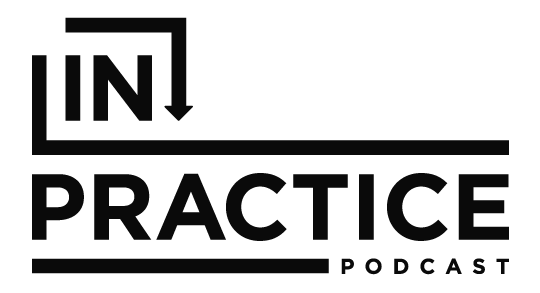S1 E1: These Uncertain Times
Guests: Dr. Jud Brewer, Brown University neuroscientist and psychiatrist – Dr. Romie Mushtaq, neurologist and mindfulness trainer – Dr. Jon Caldwell, trauma-informed psychologist and clinical research investigator.
The initial news of this coronavirus didn’t hit everyone at the same time or in the same way…but it did hit everyone. For each of us, there was a turning point where the virus first changed our thoughts and behaviors. But no matter what your first act of pandemic life was, the reason your brain prompted you to stop and do something different was because it was doing its job.
So, what exactly does fear do to the brain? And how can we guide our minds toward calm in these uncertain times?
PODCAST TRANSCRIPT
David Condos
In the early stages of the COVID-19 pandemic, we knew even less about the virus than we do today. We still don’t know everything. But back then, we really had no idea. How is it spread? What can we safely do and what’s gonna happen next? Now, we’ve all experienced varying amounts of uncertainty in our lives before, but this time felt a little different. And the moment when it all became real for me was when I went to the grocery store.
This was in mid-March when the lockdown dominoes were just beginning to fall. So, of course, there were empty shelves where bread and toilet paper used to be. But I live in Nashville, Tennessee, so that kind of thing happens when the forecast calls for a dusting of snow. Here’s what made this trip to the grocery store different…what’s seared into my memory.
In a town that’s famous for its friendliness among strangers, no one was talking to each other. In aisles crowded with silent shoppers, no one was even looking at each other. We were each on our own separate missions, focused only on getting what our brains told us we needed to feel safe. It was the closest I’ve ever felt to being in the opening scene of a zombie movie. The fear and the uncertainty surrounding the coronavirus had not only changed our thoughts, but it also changed our behaviors…the way we saw the world.
The COVID-19 pandemic is more than a story about a severe acute respiratory syndrome. It’s a story about us, and about the ways that this global event is changing our minds, our relationships, and our communities. I’m David Condos, and this is In Practice: the story of the other pandemic, the one that’s happening between our ears. Episode one: these uncertain times.
I’ve covered mental health issues for the past several years. And during that time, I’ve had the opportunity to hear from hundreds of doctors, advocates and individuals whose families in futures have been altered by mental health conditions. And here’s one thing I’ve learned from that experience: While we unfortunately don’t know too much about the COVID-19 virus at this point, we do know something about the brain and how our bodies and minds respond to crises.
So, I’m bringing together some of the world’s leading experts from the fields of psychology, neuroscience, public health, trauma and recovery, to ask them some big questions. What are they learning? What keeps them up at night? Where do they see rays of hope? And what can their discoveries teach the rest of us?
The initial news of this coronavirus didn’t hit everyone at the same time or in the same way. But it did hit everyone. It was hard to miss.
For every person listening to this right now, there was a turning point where the virus first changed your thoughts and behaviors. Think back to the first few months of 2020. What is your earliest memory of how the idea of the pandemic made you stop and think? Where the pre-COVID chapter of your life officially ended?
It could be the first time that you counted to 20 while washing your hands. Or when you stopped mid-motion to change a handshake into an elbow bump. Maybe it was making the difficult choice to postpone visiting a loved one or sitting in your living room trying to decide whether it was safe for you to go to work or not. Whatever your first act of pandemic life was, the reason your brain prompted you to stop and do something different was because it was doing its job. It was responding to the fear and uncertainty that spread like a wildfire ahead of the virus itself. But there’s a reason that our minds have developed this way. In many circumstances, our brains fear response helps us, you know, not die.
Dr. Jud Brewer
You know, fear is actually there to help us survive, and we learn based on fearful scenarios.
David Condos
Dr. Jud Brewer is a psychiatrist and neuroscientist. He directs Brown University’s Mindfulness Center in Providence, Rhode Island.
Dr. Jud Brewer
You know, you step out in the street, you almost get hit by a car and you learn to look both ways before crossing the street or, you know, anything like that. That’s actually a pretty adaptive survival mechanism that we’ve had, you know, forever. It’s actually the most evolutionarily conserved learning process known in all of science.
David Condos
And he says that when we’re talking about the brain’s response to uncertainty, the first thing to remember is that fear serves a purpose. Our brain uses it and learns from it. To understand how our minds process fearful situations, it helps to know how the human brain can be divided into parts.
There’s the primitive survival brain. That’s the part of our mind responsible for our instincts and involuntary practices like the heartbeat. It’s built to keep us alive. So, as far as our survival brain is concerned, fear is good. Our ancestors saw saber-toothed tiger, fear told their brains to run away, and they lived to parent the next generation of our ancestors. But being human isn’t merely about surviving. There’s another part of the brain called the neocortex, often referred to as the thinking brain. This part of the brain goes beyond instinct and gives humans our unique ability to plan for the future…or at least try to.
Dr. Jud Brewer
And the way we do that is that we take previous scenarios and we basically project those into the future, making predictions. Our brains basically make predictions about the future based on past experiences. And those predictions need accurate information now.
David Condos
But as Dr. Brewer explains, when that information isn’t available, our survival brain doesn’t understand that it can just take a break for a bit. It thinks finding that information and sending it up to the thinking brain is still a matter of life or death.
Dr. Jud Brewer
And so that uncertainty, really, it drives our brains crazy. Our brains really do not like uncertainty. Uncertainty drives us to learn things and, you know, it kind of puts that fire under our butts to go out and get information. Yet if we’re running around looking for information and that information isn’t available, that’s when we start to get anxious.
David Condos
So how do we overcome all that to function in normal times? You remember normal times, right?
Dr. Jon Caldwell
We move through life most of the time with a lot of sort of mental gymnastics that help us think that we have more power and more control than we actually do. And that’s for good reason. Because if we were walking around really tuned into the reality of what the sort of the risks that we actually encounter on a daily basis, it would be overwhelming for us as humans.
David Condos
That’s Dr. Jon Caldwell, a psychiatrist and clinical research investigator who specializes in treating trauma. He currently serves as Chief Medical Officer with The Meadows in Wickenburg, Arizona. And the mental gymnastics he describes actually point to how amazing our brain is at this job. Not only does it constantly scan our environment for potential threats, and react in ways that help us avoid danger, but it’s also really skilled at hiding all of that survival work behind the curtain. So, we can enjoy a fresh breath of mountain air instead of worrying that we might forget how to breathe. And this system works beautifully…most of the time.
Dr. Jon Caldwell
But what happens, of course, is in times like this, all of those kind of mental gymnastics start to break down. And we start to recognize that life is very fragile, that we have less control than we thought. We as humans like to think that we sort of stand on bedrock, you know, we like to put our put our flag into something really solid and firm and that we are on solid ground. But in reality, we’re on shifting sand a lot of the time and I think that can really take up a lot of fear.
David Condos
And when you think about it, it actually makes sense that this particular pile of shifting sand is such a confusing and uncertain place for us. Here’s how Dr. Romie Mushtaq describes it.
Dr. Romie Mushtaq
The pandemic of fear is as dangerous as the pandemic of disease.
David Condos
Dr. Mushtaq is a neurologist, integrative medicine specialist, and mindfulness trainer. She’s currently the Chief Wellness Officer with Evolution Hospitality, based in Orlando, Florida.
Dr. Romie Mushtaq
For people that are not necessary fairly familiar with infectious disease and public health policy, it feels like the news headlines are changing daily and that can feed into the fear.
David Condos
And even with the world’s foremost medical experts focused on this one challenge, it still takes time and trial and sometimes error to build a scientific knowledge base from scratch.
Dr. Romie Mushtaq
You know, we now have instantaneous news at our fingertips on social media, on Twitter, unable often to decipher what’s true or not true and the 24/7 news cycle. So, it’s really hard to escape and find a place of quiet and peace when we’re surrounded by noise.
David Condos
And to psychologists, the way that this noise spreads fear isn’t too different from the way that airborne molecules spread the coronavirus. It’s a phenomenon called social contagion. And it works by passing an emotion from one person to another.
Dr. Jud Brewer
That gets spread even more easily than a physical virus because someone can sneeze on your brain from anywhere in the world.
David Condos
That’s Dr. Brewer from Brown University again. So how does this social contagion work? Part of the answer has to do with our brain’s mirror neurons. These are motor cells that light up when we see or even hear someone else doing the same thing we’re doing. This often has positive results. Think of how a baby responds to a parent’s smile by smiling back. Some neuroscientists even believe that social contagion helped build the foundations of human culture, like forming a shared language or learning to use tools. But as you might have guessed, this concept applies to negative emotions, too. Dr. Mushtaq illustrates this point with an example.
Dr. Romie Mushtaq
Emotions are contagious, including at the workplace. So, if one person, the leader especially, is hijacked by fear or in this place of trauma, it now becomes infectious and your entire team becomes stressed or full of fear or anxious or whatever it is that their mirror neurons are seeing and experiencing from the leader.
David Condos
And the impact of social contagion is heightened by the situation we’re facing. The main positive action we can take right now is to social distance. And as it turns out, that action disrupts one of the main ways we regulate our nervous systems. Dr. Caldwell from The Meadows explains.
Dr. Jon Caldwell
So, it’s notjust like the fear of being disconnected, the fear of being disconnected by death or not having people around us in times of need, but actually, the fear is increased when we can’t reduce the fear through social connections. So, it’s sort of a double whammy: the fear of not being able to connect, and then just having fear and not being able to regulate it through social connections.
David Condos
So, it’s suddenly easier to get information and misinformation from people we’ve never met than it is to hug our grandmother. Dr. Brewer says this can create a recipe for disaster.
Dr. Jud Brewer
So, if you get uncertainty and then you start running around trying to get information and you go online or you go to a unreliable news source, that can actually turn into panic when we see a bunch of other people speculating about the future or thinking about these worst case scenarios or whatever. And that’s all bets are off in terms of our thinking brain. We get into panic mode.
David Condos
Before we find some answers about how to avoid this doom spiral, let’s answer one more question about the brain. If our mind knows how to survive and protect itself and solve complex problems and do all these amazing things, why does it keep getting pulled into this endless loop of anxiety? Doesn’t it realize it’s harmful and just stop? Well, unfortunately, it’s not that simple. One reason: we trick ourselves into thinking that we can worry our way out of this.
Dr. Jud Brewer
There’s a fair amount of research dating back to the 1980s showing that worry itself serves as a distraction or as a way to make us feel like we’re in control because we’re at least we’re doing something by worrying.
David Condos
Dr. Brewer brings up another feature of our brain that we’ll keep diving into throughout this series. When the brain is in an unhealthy state or faces adverse conditions, it can become counterproductive. For example, a 2011 study from Penn State University and Towson University describes a type of worry-distraction cycle known as the contrast avoidance model. Those researchers found that among people with generalized anxiety disorder, worrying serves as a coping mechanism to avoid sudden shifts in emotion, or contrasts. Basically, instead of waiting around for bad things to happen, and then losing control of my emotions in the wake of that, I’ll just start worrying mow, while at least I’m in control of my response.
Dr. Jud Brewer
And that feeling of control or distraction actually feels better than the anxiety itself, at least for a while.
David Condos
But that relief doesn’t last because worrying doesn’t actually solve the problem.
Dr. Jud Brewer
And then we start to, you know, go over that event horizon into the black hole of anxiety as it gets…the anxiety triggers worry, which triggers anxiety, which triggers worry, which you know, and so on and so on. And here I would say, anxiety can actually turn into a habit where it can be learned in the same way that other habitual behaviors are learned. And unfortunately, I think we’re already starting to see a societal habit form around anxiety.
David Condos
In many ways, we’d already primed our brains to fall for this long before the COVID-19 pandemic arrived. Think of it this way: When I feel anxious about something, what’s my first response? What’s my instinct? Is it to go for a walk or read a book or meditate? No. Even though my brain has heard from many interviews with mental health experts, that those are the things that will actually help me, more often than not, my instinct is to pick up my phone. Here’s Dr. Mushtaq.
Dr. Romie Mushtaq
And then it’s all too easy if we have our digital devices at the bedside…look at the latest count of cases or what’s trending on Twitter. The temptation is there but don’t. That’s an addiction, the need for your hands to touch a screen. It’s actually a pattern of addiction and it creates this dopamine reward circle very similar to addiction to alcohol or drugs.
David Condos
And like a chemical addiction, a behavioral addiction can change the brain biologically. Dr. Brewer says this same dynamic can apply to worrying.
Dr. Jud Brewer
Because behaviors don’t form based on the behaviors themselves, in the same way we can’t, you know, we can’t break a bad habit, for example, based on just changing the behavior. Otherwise, you know, my patient comes into my office and wants to quit smoking and I say, “Okay, stop smoking.” And then they would just stop or stop overeating or stop being anxious, stop worrying. It doesn’t work that way.
David Condos
So, if it doesn’t work to change the behavior, how does it work? And how can we keep our brains from slipping back into unhealthy patterns over the long term?
Dr. Romie Mushtaq
In order to come back, this isn’t about a new normal, it is about a new way of being. And that is what mindfulness teaches us.
David Condos
This goes back to the survival brain that we talked about earlier. For generations of ancestors, our brain reacted to perceived threats, and was rewarded for that behavior with survival. So, now feeling fear comes easily for us. It just happens. And paradoxically, being calm often takes work.
Dr. Romie Mushtaq
It’s very hard to pull away from this news cycle and social media, whether we’re drawn to what’s happening in the world or using it as a distraction. And so mindfulness can feel like more of a struggle. But it’s now that we need to pause more than ever. And that concept is, in order to speed up, we first must slow down.
David Condos
But it’s hard to slow down. And in the middle of a global pandemic, getting our brains to pause can be a tall order. But as Dr. Mushtaq says, just because it’s not easy, doesn’t mean it needs to be complicated.
Dr. Romie Mushtaq
For many people, it’s as simple as spending three to five minutes outside and asking yourself: What are two things that I see right now? What are two things that I hear right now? What are two things I can smell right now? What are two things I can taste and what are two things I can touch? And really resetting your senses as much as possible. That’s mindfulness…that present centered awareness and learning how to anchor back in calm.
David Condos
In order for this calm to stick, our brain needs to be rewarded for seeking it. At the Brown University Mindfulness Center, Dr. Brewer’s team studies how this type of reward-based learning can retrain the brain. In early 2020, they published research that follow doctors at a Massachusetts hospital. Now these doctors had been experiencing anxiety but didn’t think they had enough time for self-care. So, Dr. Brewer’s team developed an app for them called Unwinding Anxiety. It delivered mindfulness training and daily 10-minute exercises.
Dr. Jud Brewer
And after three months, there was a 57% reduction in these clinically validated anxiety scores. We’ve looked at the generalized anxiety disorder seven measure, which is a pretty standardly used measure, and got a 57% reduction. So short, small bite-sized pieces, could actually train people to be able to work with their anxiety in a way that was accessible.
David Condos
And with each small step toward mindfulness, we can teach our brains that taking that walk outside is generally a better choice than taking another stroll through the day’s headlines.
Dr. Jud Brewer
That’s where we can start to see, “Oh, you know, constantly checking the news isn’t that rewarding.” And when we see that really clearly, we don’t have to force ourselves to stop checking the news all the time. It’s a matter of really recalling, “Well, what’s it like when I, you know, totally get caught up in the news versus, you know, when I moderate my news consumption?” And we can let our survival brains take care of the rest.
David Condos
So, if your brain has trouble finding calm these days, the message from these experts isn’t “try relaxing harder.” They say that we should start by taking stock of what’s actually helpful in our lives, and then invest more of our time in those interests or activities or people. Especially in these uncertain times, they encourage all of us to take the chance to prioritize what’s truly important. Here’s Meadows Chief Medical Officer Dr. Jon Caldwell again.
Dr. Jon Caldwell
And so even the fear of death can be a gateway into understanding the preciousness of life. It is uncertain, you know, this is impermanent. I don’t have all the answers. I don’t know what’s coming down the road, then all sudden, we recognize like, this phone call with my loved one is important. It’s meaningful.
David Condos
And maybe facing the uncertainty of this time can make us more thankful for what we have right in front of us.
Dr. Jon Caldwell
We start to let go of those things that are maybe not as important that are a little bit more petty. And we can let that go and recognize what really matters for my life right now. And that’s pretty profound, really, I mean, that’s the main thing that we get to sort of carve away some of the things that matter less and focus more on what really matters in this life. And that’s a gift that comes out of that leaning into the fear around death.
David Condos
The COVID-19 pandemic has brought us face to face with some big questions. Questions about life, about death, and about what living through this type of crisis does to our brains.
How does fear turned into stress? How does stress turn into trauma? How does trauma turn into resilience? And how can resilience prepare us for the next crisis? I’ve been finding answers to those questions with some of the world’s foremost mental health experts.That’s coming up on this season of in practice.
So, how are you feeling? What things are you struggling with right now? What questions do you have about how this crisis impacts our brains and what we can do about it? Let me know via the contact form inpracticepodcast.org and I’ll do my best to find answers to your questions too.
This episode was reported, produced and sound designed by me, David Condos. Original music composed by Adam Bokesch. And editorial support provided by Julia Barton through a mentorship from the Association of Independence in Radio.
Finally, thank you for listening. And please help us spread the word about this show. You can leave us a review on your podcast app and subscribe so you’ll be the first to know when our new episodes come out. Until next time, stay safe and be well.







